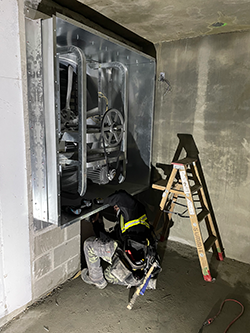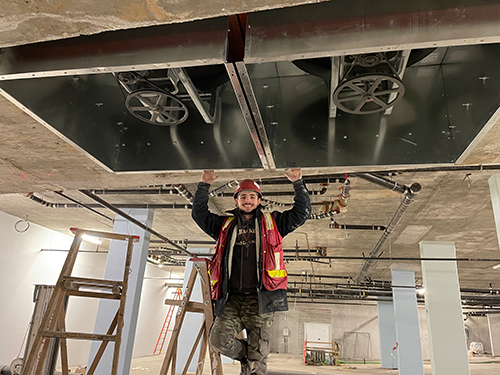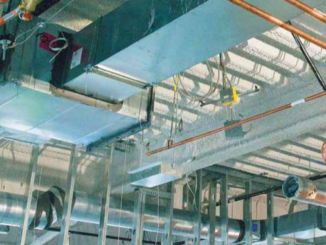
SMACNA-BC’s groundbreaking Double Dispatch Program redefines job security.
By Natalie Bruckner • Photos by Summit Sheet Metal
In an industry susceptible to cyclical fluctuations and labor shortages, SMACNA-BC has spearheaded a game-changing labor sharing system that is reshaping the employment landscape. Known as the double dispatch program, this innovative initiative allows skilled sheet metal workers to be employed by multiple SMACNA-BC member companies, effectively putting an end to temporary layoffs.
“The idea behind the double dispatch program came about four years ago driven by the pressing challenges we faced in the industry. We were finding that during slow times, we really didn’t want to have to lay somebody off that’s really good, but sometimes you just don’t have that option,” explains Phil McDonald, co-owner of Summit Sheet Metal and immediate past-president of SMACNA-BC. “Recognizing this issue, SMACNA-BC’s board of directors came up with the double dispatch concept as a way for a person to work for multiple companies—ensuring employment opportunities even during periods of reduced demand. The idea was put forward to the SMACNA-BC / SMART Local Union No. 280 Joint Conference Board, who were totally onside.”
The double dispatch process has been deliberately designed to be simple and streamlined. When a company requires additional workers, they simply contact SMACNA-BC, which leverages its extensive network to identify individuals with the necessary skill set who are available. Prior to assigning a worker, SMACNA-BC provides detailed information about the individual’s strengths and limitations, ensuring a clear understanding of the skills being lent. No formal agreements are signed; the program relies on trust and cooperation. Although workers need to visit the union hall to be dispatched for double dispatch assignments, the process remains uncomplicated.

The double dispatch program plays a vital role in retaining skilled workers within the industry and alleviating the feeling of being discarded during slow periods, as highlighted by McDonald. “It cultivates a sense of significance and job security for the workers,” he asserts. By facilitating connections between workers and multiple companies, SMACNA-BC eliminates the need for individuals to independently seek out employment. This not only helps retain valuable talent but also nurtures a collaborative and supportive atmosphere among industry competitors.
Like any new program, the double dispatch initiative encountered initial skepticism. “In the early stages, people approached the idea with caution. Only a couple of companies possessed the necessary trust and willingness to take the lead,” recalls McDonald. These pioneering companies served as early adopters, showcasing the program’s viability, and consequently, it gained momentum, attracting more contractors. McDonald shares, “Around two years ago, I had the privilege of having 16 individuals from other companies lending their expertise.”
Before the program’s introduction, contractors were reluctant to lend out workers due to concerns about potential liability for workers’ compensation claims if an employee were to sustain an injury while working for another company. McDonald explains that the double dispatch program addresses this concern by ensuring that the worker remains employed by their home company and is merely loaned out to other businesses. This arrangement effectively alleviates the liability burden associated with workers’ compensation claims, providing reassurance to contractors participating in the program.
While the double dispatch program has been successful in alleviating some of the pressure caused by the current labor shortages, the construction industry’s overall high demand for workers presents limitations to its effectiveness. The industry is currently grappling with a significant shortage of skilled laborers, with projections indicating a shortfall of 81,000 workers by 2030. Consequently, loaning workers to other companies becomes challenging when every company is in desperate need of additional staff.
“Despite most companies being inundated with work and their workers kept busy, the program is still proving to be a success. For example, two months ago I borrowed two guys for a week. It was a case of beg and borrow but finally someone came forward. These are unprecedented times in that industry-wide in the lower mainland we are about 100 to 150 skilled workers short. In my 30 years in the industry, I’ve never seen it like this. Typically, we have a backlog of work spanning a couple of years, but at present, we have sufficient projects to keep us occupied until the end of 2027. Every company needs people, and that’s the challenging aspect. So, loaning workers out becomes difficult when you are already operating at full capacity,” explains McDonald.

Despite this, he explains that the double dispatch program continues to thrive. Currently, around a dozen contractors actively participate in the program, underscoring its relevance and impact. Even during times when companies are overwhelmed with work, the program remains a valuable resource for finding additional skilled laborers on short notice.
One recurring challenge faced by the program however is when a loaned worker refuses to return to their original company—a situation that McDonald says requires delicate handling to avoid burning bridges. “This has actually happened quite a bit and what follows is a very open conversation to find a mutually agreeable solution. Maintaining positive relationships and ensuring that the needs of all parties involved are met is essential,” he says.
On the flip side, an unforeseen benefit of the double dispatch program is the exposure it provides workers to different perspectives and industry insights. “For instance, an individual who has been with us for 10 years may acquire additional skills and knowledge by joining another firm for a short-term assignment. It can be a breath of fresh air, and in some cases, workers may discover new trade secrets or tools to add to their repertoire. However, there are instances where it may not be a good fit, and in such cases, I would find an alternative solution. Ultimately, we view ourselves as a team, a family, and we value each person as an individual rather than just a number. Therefore, we approach each situation on a case-by-case basis,” explains McDonald.
McDonald expresses his desire to witness the industry-wide expansion of the program, recognizing that its widespread adoption relies on factors such as trust, shared values, and effective communication among participating companies. However, he acknowledges that achieving such widespread implementation may take time and require concerted efforts.
Nevertheless, the success of the double dispatch program has garnered recognition beyond the industry itself. McDonald reveals that the plumbing and sprinkler sector have taken note and implemented a similar program, which has also proven to be effective in their domain. This cross-industry recognition further highlights the positive impact and viability of the program, paving the way for potential future expansions and adaptations. ■



